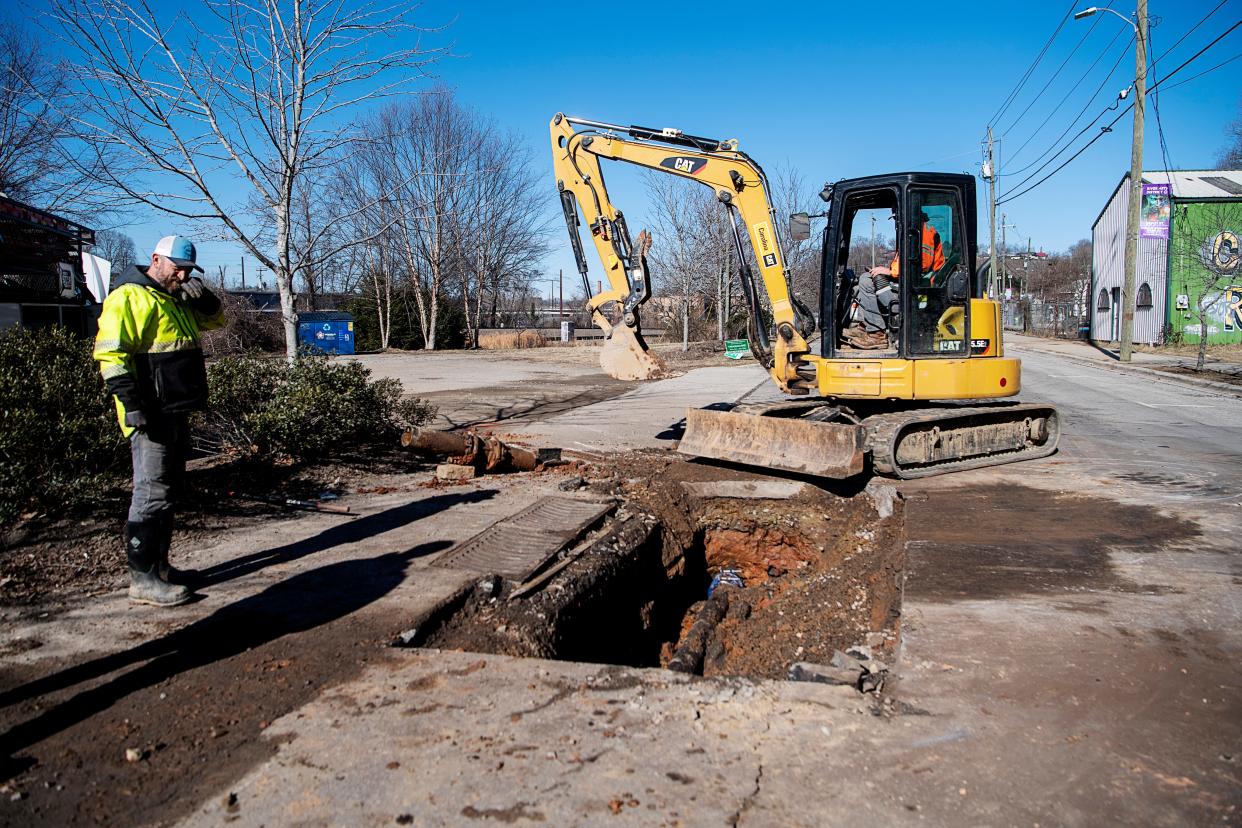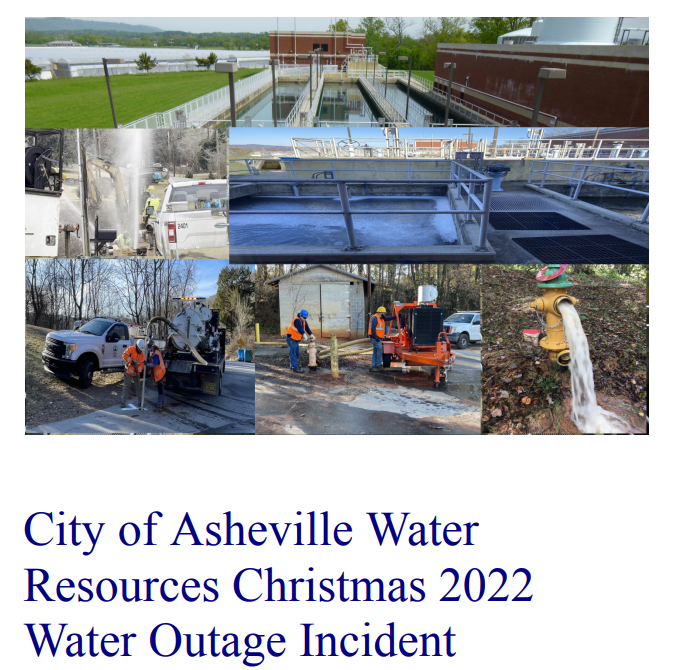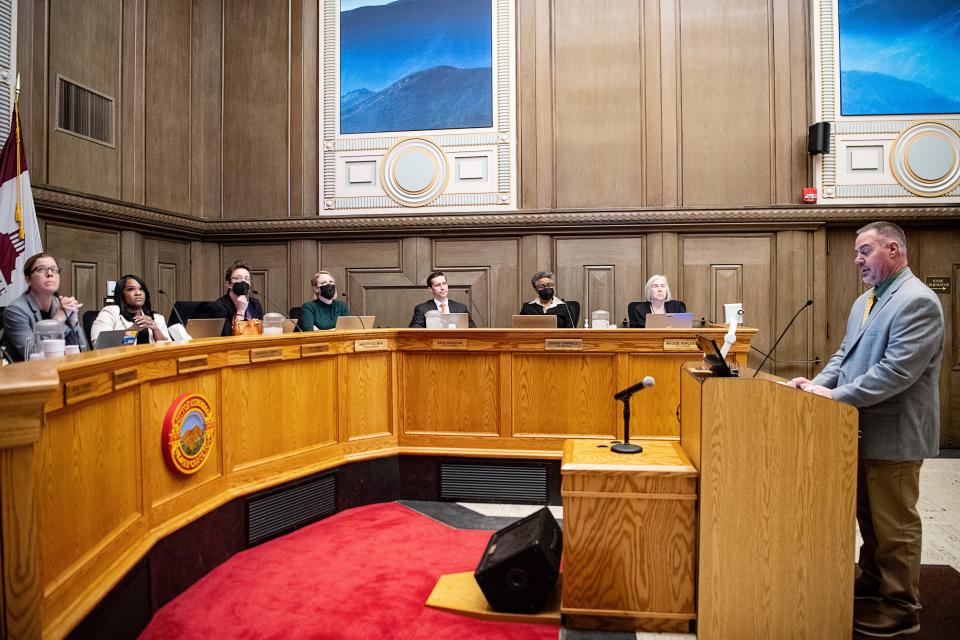Read Asheville's water After Action Report: Inside the crisis that impacted thousands

ASHEVILLE - The city's internal After Action report on the Christmas 2022 water outages was released via public record request to local media April 19, offering the first truly interior view of the crisis that impacted "tens of thousands" of water customers.
Though issues of transparency and communication were noted concerns during the entirety of the incident, City Council members April 20 were disgruntled at the public document's release prior to their notification, and said it should have been released to them first or at the same time it was released to the media.
The 72-page After Action Report and Improvement plan are an overview of the incident. It is both technical and narrative in nature, with a more detailed timeline, action plan and incident summary than has been provided previously.
It contains five main objectives, including determining the root cause of taking the Mills River Water Treatment Facility offline, the loss of pressure in the southern and western portions of the distribution system, and goals for greater resilience during extreme cold temperatures.
Other objectives of the report were to:
Assess proactive procedures using AVL Alert, social media and city webpage to educate all water customers before and during extreme weather conditions.
Assess potential needs that regional water utilities and federal, state and local governments can provide to mitigate an emergency.
It also highlights immediate and recommended actions for future prevention, several of which have already been undertaken by the water resources department.

More: Water outages: Asheville chose to cut off the south from water; Melton made the call
More: Asheville announces downtown safety initiative: 'A very visible' police presence to come
What's new with the Independent Review Committee?
The After Action report will also be considered by the water outage independent review committee, a third-party, nine-person body ultimately responsible for analyzing the events and circumstances that led to the outages, the creation of which was approved Jan. 10.
Work of the committee began Feb. 20, and will culminate in a final written report and presentation to council. In an April 20 update, Jade Dundas, the city's capital projects director and liaison to the committee, gave a brief update.
He said the group is committed to delivering a report on May 30, but an in-person presentation to council is not expected until a council meeting in June.
Meetings of the committee, which City Attorney Brad Branham described as a "task force" are not required to be open to the public, and have not been.
Branham told the Citizen Times via email April 21 that as the committee does not perform any legislative, policy-making, quasi-judicial, administrative or advisory functions, and will only conduct an independent review of the subject incident and create a report of their findings, they aren't considered a "public body."
"However, it is the intention of the City that the group's final report will be made public as well as be presented in an open forum during a City Council meeting," Branham said.

More: Who will sit on Asheville's water outage independent review committee? Here's the vote
More: 1st Asheville council agenda briefing: Biltmore Ave. garage 2-week closure, water update
More on the report
The After Action Report appears to come out of the water resources department, but participating departments are listed as the city manager's office, the city's communications department, risk management and the Asheville Fire Department.
City spokesperson Kim Miller confirmed it was created internally by staff.
Of the process, she said, "internal after-action reports are derived from a root cause analysis carried out by City staff after any incident and are a common operational practice. An after-action report allows staff to compile information and procedures for analysis. As with any debriefing, our goal is to identify any system adjustments or improvements that can be made to better serve the community."
A summary of preliminary findings began in January, and were presented to council Jan. 10, Miller said.
"Following this meeting, the Water Resources Department conducted a more detailed analysis of the event causes, and possible solutions were then used to create the after-action report to guide operational decisions."
Most significant changes
In response to the "most significant changes" to come out of the report, Miller said:
Templates for customer education have been created for the AVL Alert system to help customers prepare before extreme cold weather and tropical storms should a water outage occur. The templates are in Appendix of the report. These will be sent via AVL Alert. Residents can sign up to receive them at member.everbridge.net/453003085611892/login.
Standard Operating Procedures have been updated to help train and educate employees for cold weather and tropical storms so that preventative measures are in place. SOP training and review occur annually.
A lengthier presentation will be made on the report April 25 at the regular City Council meeting. Meetings are held at City Hall in council's second-floor chambers. Persons wishing to speak live at the meeting will be required to attend in person and must sign-up at the door outside the Council Chamber.
The meeting will be live on Charter/Spectrum Channel 193, the City's YouTube Channel, or the City's Virtual Engagement Hub.
More: Is there room in downtown Asheville for less parking, more bike lanes? Residents weigh in
Where can you find the document?
The public document was first obtained by WLOS in response to a long-standing public records request, received by the city Dec. 29, which can be found with the report itself at https://cityofashevillenc.nextrequest.com/requests/22-590.
“I just want to, again, echo how important this is," said council member Sage Turner of a desire to have received the report earlier. "I was interviewed by the crew that we hired (to conduct the Independent Review Committee), and time and time again, the problem was that there was an issue with the water situation and the council wasn’t informed. It felt like that yesterday, again, to hear from the media that there was a report already out.
"I just want to express the sensitivity of some of these things, and really emphasize we should get them first."
According to the report's timeline, while "turbidity" issues at the Mills River water treatment plan began early morning Dec. 24, and the plant shut down the morning of Dec. 25, Water Resources Director David Melton didn't notify City Manager Debra Campbell and Assistant City Manager Ben Woody until 8 p.m. Christmas Day.

At 10:50 a.m. on Dec. 26, Christy Edwards, a city spokesperson, notified the "Council group and department directors." City Council was then "emailed" at 10 p.m.
Similarly, Mayor Esther Manheimer voiced concerns. She said it "was not the intent to release this without notification to council," and she and others called for an April 25 presentation from staff to summarize the report's main points, with the understanding that the "bigger" committee review is incoming, which "may or may not concur" with the internal report.
More: $1 downtown property sale? Asheville considers transfer of Hunt Hill for youth programs
More: Answer Woman: What comes next for the long-awaited Karen Cragnolin Park on Amboy Road?
"As promptly as possible"
Under North Carolina's public records law, documents or materials made or received by a government agency, while conducting public business, are public records. This includes drafts, at every step of the process.
So does a public document need to first go through the policy-making body of a city before its release?
“The answer is largely no," said Mike Tadych, a Raleigh-based attorney serving as co-counsel for the N.C. Press Association and other media organizations, with a focus on open government, among other specialties. The law says public records are to be released "as promptly as possible."
There are some caveats, he said, like drafts of certain auditing records that, by statute, are not public record. "That wouldn’t apply, in my understanding, of what happened here.”
“The body of law around the public records law is that you err on the side of openness," Tadych said. "I could not identify, and I don’t believe anyone else identified, a statute which made this exempt or provided a window in which only the government could have it, and the people couldn’t."
Sarah Honosky is the city government reporter for the Asheville Citizen Times, part of the USA TODAY Network. News Tips? Email shonosky@citizentimes.com or message on Twitter at @slhonosky. Please support local, daily journalism with a subscription to the Citizen Times.
This article originally appeared on Asheville Citizen Times: Asheville's internal water outage report offers closer look at crisis

